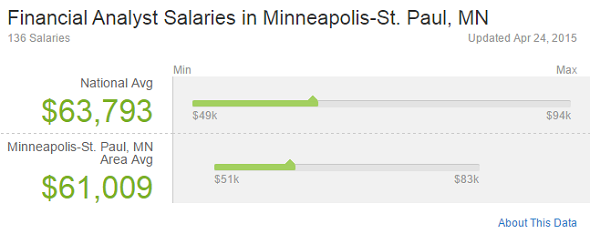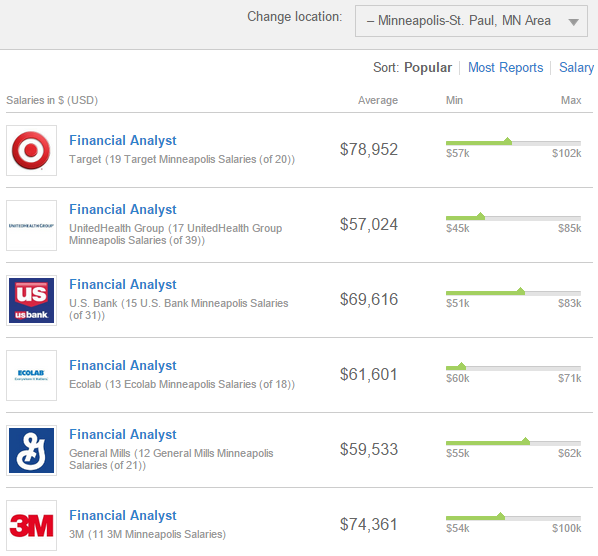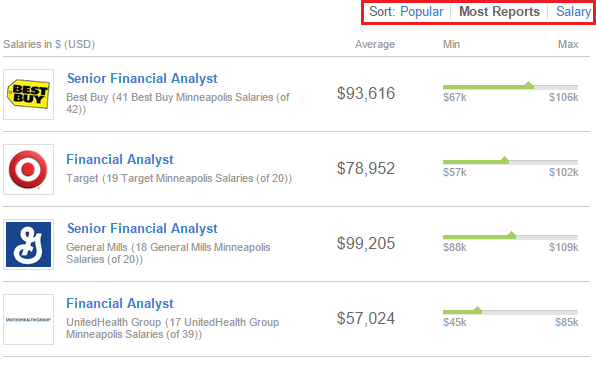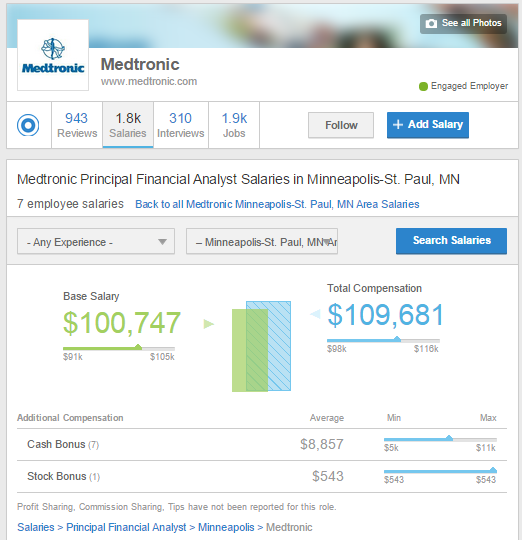 When I was in salary negotiations five years ago I was very concerned about getting an offer that was more or less than the other interns who were receiving offers.
When I was in salary negotiations five years ago I was very concerned about getting an offer that was more or less than the other interns who were receiving offers.
Not surprisingly, interns shared information. When one intern received a slightly higher salary offer, it allowed me to also negotiate a slightly higher starting salary.
The main thing I took away from this experience was this:
The more data and insight you have into what other people are making in comparable jobs, the more leverage you have when you negotiate your salary.
Over the past decade the internet has played a huge role in giving employees leverage when it comes to salary negotiations.
No longer is salary and compensation information shared purely through word-of-mouth. Entire companies have been created with the sole purpose of helping people find and compare salary data.
With the wealth of salary data on the internet today it would be foolish to not review the salary data available for the company and position you are negotiating with.
Use Glassdoor to Find and Compare Salary Data
There are a couple of websites that are great for finding and comparing salary data. The two best sites are PayScale and Glassdoor. While PayScale is good, I think Glassdoor is by far the best option. From my experience it it’s easier to use than PayScale and has more salary data.
When you go to the Glassdoor website, you can quickly and easily search right from the home page.
For the sake of this example, let’s say I want to see what a financial analyst makes in the Minneapolis-St. Paul metro area. Is simply plug these into the appropriate boxes and hit enter.

The first thing I see on the next page is a summary of the average financial analyst salaries, both nationally and for the Minneapolis-St. Paul metro area.


Notice that you can sort the companies by Popularity, Most Reports, and Salary. Obviously the more reports that are provided the more accurate the salary will be. Conversely, companies that have few salary reports are less reliable.

Seeing what specific jobs are paying at various companies can be extremely useful, especially for those looking to move to a different company or who are open to going to a new company if the compensation is significantly higher.
When I was negotiating my salary for my current position I greatly utilized Glassdoor. I utilized both company-specific data as well as looked at what other companies were paying comparable positions.
If a company is large enough there can be a wealth of valuable salary data available to you for the specific job you are negotiating for. This was unheard of just over ten years ago, where word-of-mouth was really the only way for a professional to gain this sort of information. Below is data for a specific financial analyst position at a specific company:

To utilize salary date in negotiations, be sure to do a few things:
- Never negotiate without researching
Never ever start salary negotiations without first doing your research. In the future I suspect employers will try to push salary negotiations when candidates are unprepared because it’s their only opportunity to have the upper hand. If this happens, do whatever you can to delay negotiations until you have done thorough research on comparable salaries.
- Use other company data to your advantage
Just because the average pay for a position you are looking at is $X, doesn’t mean you have to shoot for that salary. If the company’s average compensation is lower than comparable companies in your geographic area, make sure to mention that fact. Casually saying something like “the average pay for comparable positions at other companies is $Y, can we move closer to that amount?”
The worst that can happen is an employer saying that they have compensation policies at their company that do not allow them to go higher. If you are confident in your abilities and would have trouble getting paid less than what you could get (on average) at another company, stick to your guns.
- Don’t sell yourself short
If you’re armed with salary data both for the company you are negotiating with as well as other companies, shoot for a high salary. In an ideal situation you will shoot high and force the employer to compromise at an amount that you were happy with in the first place.
Additionally, try to avoid naming a salary figure first. Unfortunately some job applications require you to put your mandatory minimum. Be weary of setting that minimum too low, because you essentially are giving a number for the company to use in negotiations right off the bat. Thoroughly research salary data before filling in that box.
While we love to talk about side hustles and ways to make money outside of your 9-5, the reality is that if you can make more money while working similar hours it makes no sense to not fully capitalize on your 9-5 job. Making even $3,000 more per year can have a material impact on your finances.
Research salaries, arm yourself with data, and make sure you are getting paid a fair amount!
Have you ever used Glassdoor or a similar service to compare salary data? Do you think too many people go into salary negotiations without researching?


I used Payscale and Glassdoor both to receive my 12% raise last year – only to have my boss tell me after we signed the papers “there is still plenty of room for growth; we can look at it again next year”. I think I undervalued myself. At the same time, my employer isn’t known for paying well, so I didn’t want to shoot TOO high.
They are great tools – anyone who isn’t using them is probably short changing themselves.
Doing research via Glassdoor and other online resources can be a great idea, but it is also really important to know your audience. I’m of the internet generation, so I really trust the information that websites like Glassdoor give me. However, during my last salary negotiation (for a raise) I learned that my boss, of an older generation, thought that Glassdoor was a completely incredible source. He much preferred to call a few friends and get three individual data points for comparison (as opposed to the hundreds of thousands or more data points available online).
When I graduated and accepted my first job as a physical therapist the best resource for me was asking my classmates and friends who had graduated before me how much they were offered. I find online resources to be slightly less credible because in my field pay differs so greatly between regions and states. Pay also differs in what type of job setting you work in. Private clinics actually pay substantially less than hospitals. There is also a big difference between being a completely new grad and having 2-3 years experience. Most online pay info lumps years of experience into broad categories. mrandmrsbudgets
It is so important to use the data you can get. Also, even if you know the numbers and get a good offer, don’t be afraid to ask for more, and give a reason why you think you should receive more. I’m in my 2nd job, and asked for more salary on both offers. The first time they said “no” but then put in my contract to get the raise in 6 months if I performed well. The second time, the HR rep made a big deal about not asking for more, and that the offer I was getting would be their best offer. While it was good, I still asked for a little more (with a good reason), and they gave it. Know your numbers, and know yourself. Thanks DC!
indebtedmom Even if you did undervalue yourself, you likely got more than you would have if you didn’t have the data and insights from PayScale and Glassdoor. Plus the fact they said “there is room for growth” should give you confidence to ask for more in the future.
Ali_AnythingYouWant Good perspective. It’s difficult for me (and probably other millennials) to understand how someone could possibly trust 3 personal references over exponentially more data points. After all, the 3 references could be a bad sample, may be lying, etc. I think there is almost no incentive to lie on Glassdoor because no one sees your individual salary.
mrandmrsbudgets Glassdoor (and PayScale, I believe) adjust for geographic variables. I think it becomes tougher when you are working in areas that can vary greatly, but with that being said most jobs vary quite a bit once you get a few levels up. A senior financial consultant’s pay can vary by as much as $50k, and that’s within the same geographic area.
Gabriel Parma I had the same sitaution as you did with your second job. The recruiter tried to tell me the maximum % increase and that I should “ask for the max.” I ran the numbers using online resources like Glassdoor and quickly realized that I should be asking for more than the “max increase” per the recruiter. I ended up getting a higher amount and avoided being the first person to quote what $ or % increase I was looking for.
Glassdoor is a great tool, because you can never have too much information when it comes to negotiating salary. Most people tend to undervalue themselves and this helps them (and potentially their employer) understand their worth.
I researched my industry really well before graduating, and it helped me be a lot more confident during salary negotiations, because I went in knowing my value. If I hadn’t looked up everything on glassdoor, I would have settled for their initial offer, which was 12.5% lower.
I need to check Glassdoor out. My pay is pretty good for the work I do. I could always use more though.
When I’ve used Glassdoor in the past, I used it for sample interview questions at particular companies. I really should use it more often for salary data; I can see how that would really help with negotiations. I’ve never negotiated my salary before and I really regret not learning such a valuable skill sooner!
ShannonRyan Great point, Shannon. Glassdoor can also be used by employers to gauge how much they are paying relative to other companies. You’re right that you can’t have too much information when it comes to salary negotiation.
Anum Awesome success story! I also would not have been confident in my asking price if I didn’t do my research. The recruiter was pushing for a figure that was 7.5% lower than what I ended up getting.
Jason @ The Butler Journal It can’t hurt to check out what Glassdoor has and whether or not you are getting paid what you should be. I think Glassdoor is more relevant to certain lines of work than others, but it’s incredible the wealth of info they have on there.
Niomi@FinanciallyConfident My first promotion I did not negotiate and the job I got after that I did. I think it can make a huge impact on your finances long-term. Even getting paid 5% less than you could have may result in a material difference over time.
I’ve found Glassdoor to be reasonably helpful, but just talking to others, including bosses and people more senior than me has been very helpful to get some benchmarks about pay. Getting an indication from my partner about what sort of increase I could expect from a promotion really helped me negotiate a better salary when I moved jobs recently – I asked for an extra $10k above what was offered and got it no problems! It definitely never hurts to ask if you feel like you’re in a good negotiating position :)
Jason@Islands of Investing I think talking to others can be helpful, but more so for smaller companies or more niche jobs that do not have a lot of data available. I work for a huge company in a fairly common department, so the data available is pretty much all that I need to have a benchmark of what to shoot for.
After a long tenure with my company, I used glassdoor (and recruiters pounding down my LinkedIn Page) to realize that I was being paid lower than other’s in my field (and at my company). I’ve been able to use this information as “soft leverage” to speed up a promotion, and to increase my pay higher than a typical promotion yields.
Hannah UnplannedFinance I was in a similar situation at my work, which is why I negotiated to have my pay “right-sized.” I think younger people who get promoted quickly get the shaft a lot of the time because they think your lack of experience justifies them paying you less. If you have the right data it’s easy to refute that, though.
One thing that’s important to remember is that the majority of employers will have a compensation range set for each position. Many times it’s how prepared you are for the negotiation process that will dictate where you fall within that offer range. Know the industry and company salary statistics but also be prepared to offer what advantages you have individually. If you have focused experience or a certification, make sure to mention those things that distinguish your skill set as reasons to receive greater compensation. This will only move you up the offer range.
Financial Tour Guide Great advice. While employers typically do have a salary range for each position, it can be a VERY wide range. The further up you get the more variance there is.
Dude, I LOVE glassdoor and have used to negotiate a raise at one position, and a starting salary at another. I have also left reviews and pay information to help other potential employees know what they are getting into.
seedebtrun I also left my pay information and should probably leave a review sometime soon as well. I think it’s such an awesome resource and the business model they have is totally sustainable. People will always want salary data.